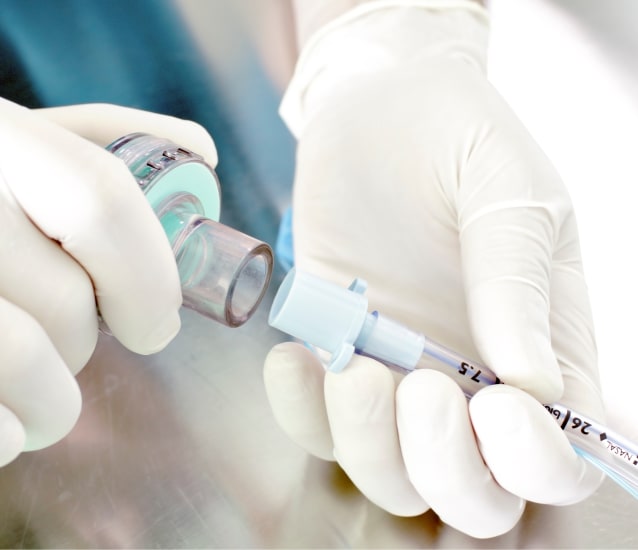Critical Care
Board-Certified Veterinary Criticalist
Arkansas Veterinary Emergency & Specialists provides critical care to pets experiencing serious illness or injury. We are proud to have the only Criticalist in Arkansas at our hospital to ensure that your companion gets the attentive care they need.

Critical Care for Little Rock Pets
When your companion becomes seriously ill or injured, they will require urgent care and veterinary attention to preserve both their health and their life.
Veterinary critical care is the constant and ongoing care provided to animals when their condition is serious, isn't stable and could require medical intervention in the blink of an eye.
At Arkansas Veterinary Emergency & Specialists, Dr. Jesse Bullock and veterinary team are proud to be able to not only provide immediate emergency services to pets suffering from pressing and serious illness, but to monitor their condition and support their recovery through our critical care services, including:
- Monitoring for pets in critical condition
- Comfortable ICU where your pet can rest while treated and monitored
- Electronic patient monitoring equipment to track your companion's vitals
The Animal Critical Care Unit at Arkansas Veterinary Emergency & Specialists
As part of our critical care services, the veterinarians at our Little Rock specialty and emergency hospital maintain a critical care unit (or ICU) for pets that require intensive treatments, therapies and monitoring until their condition stabilizes.
As part of our dedication to giving the best possible care to our patients, we will ensure that they have a clean and safe environment to rest while we monitor them and help them in their recovery from serious illness. We make sure that the patients in our critical care unit have comfortable and clean kennels, have as much privacy as possible, and get all of the diligent care and attention that they need and deserve.
Critical Care Cases in Little Rock
Animals generally require veterinary critical care services when they experience a health issue that demands consistent monitoring, treatment and therapies over an extended period of time. That could be hours, days or even a week.
Any health condition that demands extended and complex treatments, drug therapies or monitoring will likely fall under the purview of critical care. The following are some examples of health issues that may require critical care in our ICU:
- Respiratory failure
- Venomous snakebite
- Congestive heart disease
- Recovery from a major veterinary surgery
- Sepsis (extreme immune response to infection)
- Multi-trauma patients (severe physical injuries)
- Recovery from multiple transfusions or blood products
- One or more instances of acute organ failure
Veterinary Critical Care FAQs
The following are some of the most common questions our Little Rock criticalist gets about the critical care services at our hospital.
-
Can I call the hospital to check up on my pet in critical care?
Yes, you absolutely can get in touch with us to check in on your pet's health and status while they are in critical care at our facility.
Rest assured, though, that if there is any problem or change in your pet's condition, we will contact you promptly for information or updates about your companion's health.
-
How long will my pet have to remain in critical care?
A critical care unit at a veterinary hospital works somewhat similarly to a human hospital — while we may be able to provide an estimate of your pet's length of stay with us, factors may arise that impact that timeline.
We aren't always able to predict when and if your pet's condition will change or a complication will occur. However, rest assured that we will communicate with you as much as we can about any changes in your companion's condition while in our care and what that means for the duration of their stay with us.
-
What is the difference between emergency and critical care?
While veterinary critical care and emergency services have some overlap — both deal with seriously ill or injured animals — there are some important differences between these two services.
Veterinary emergency services treat pets that are suffering from serious and acute illness or injury that requires intensive and immediate care.
In comparison, veterinary critical care services also deal with serious illness and injury, but do so in cases where animals require monitoring, complex treatments and crate rest in a medical environment to help them recover.
So, while veterinary emergency services at our clinic may transfer our patients to critical care after initial triage and treatment, not all emergencies will require critical care. Likewise, in situations where a pet has undergone major planned surgery, they may require critical care to remain stable and begin their recovery without ever having been a veterinary emergency case.
-
When do your critical care services operate?
Our Criticalist can be reached by our emergency veterinary team if required to discuss the specifics of certain cases. Otherwise, Dr. Jesse Bullock sees cases on a by-appointment basis.
If you require emergency services, Arkansas Veterinary Emergency & Specialists operates with an on-site emergency veterinary staff 24 hours a day, 7 days a week, to help provide treatment and attentive monitoring of your companion's health.
-
Will you keep in touch with our primary care veterinarian?
Yes, we will keep your primary care veterinarian updated on your pet's conditions while they are undergoing critical care.
We will provide your primary care vet with your pet's medical history and files to ensure your pet receives seamless, integrated care when they return home and are seen by your vet for routine care and checkups.
From Our Clients
-
"I’ve been to AVES on three separate occasions for my fur babies. I also took my granddaughter and granddog there and I took a friend's cat there. They have always been compassionate and taken care of the fur babies I brought to them. Highly recommend!"
